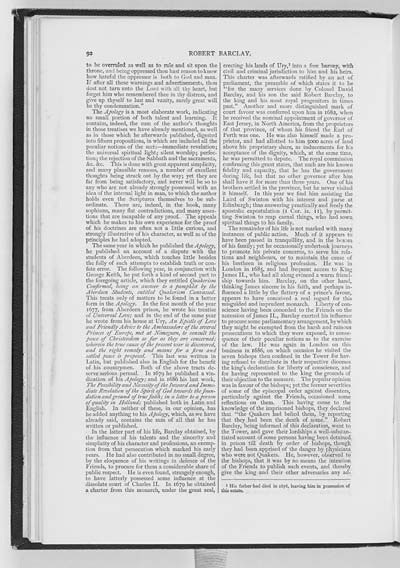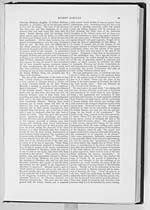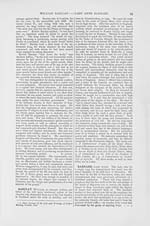92
to be overruled as well as to rule and sit upon the
throne, and being oppressed thou hast reason to know
how hateful the oppressor is both to God and man.
If after all these warnings and advertisements, thou
dost not turn unto the Lord with all thy heart, but
forget him who remembered thee in thy distress, and
give up thyself to lust and vanity, surely great will
be thy condemnation."
The Apology is a most elaborate work, indicating
no small portion of both talent and learning. It
contains, indeed, the sum of the author's thoughts
in those treatises we have already mentioned, as well
as in those which he afterwards published, digested
into fifteen propositions, in which are included all the
peculiar notions of the sect:�immediate revelation;
the universal spiritual light; silent worship; perfec-
tion; the rejection of the Sabbath and the sacraments,
&c. &c. This is done with great apparent simplicity,
and many plausible reasons, a number of excellent
thoughts being struck out by the way; yet they are
far from being satisfactory, and never will be so to
any who are not already strongly possessed with an
idea of the internal light in man, to which the author
holds even the Scriptures themselves to be sub-
ordinate. There are, indeed, in the book, many
sophisms, many flat contradictions, and many asser-
tions that are incapable of any proof. The appeals
which he makes to his own experience for the proof
of his doctrines are often not a little curious, and
strongly illustrative of his character, as well as of the
principles he had adopted.
The same year in which he published the Apology,
he published an account of a dispute with the
students of Aberdeen, which touches little besides
the folly of such attempts to establish truth or con-
fute error. The following year, in conjunction with
George Keith, he put forth a kind of second part to
the foregoing article, which they entitled Quakerism
Confirmed, being an answer to a pamphlet by the
Aberdeen Students, entitled Quakerism Canvassed.
This treats only of matters to be found in a better
form in the Apology. In the first month of the year
1677, from Aberdeen prison, he wrote his treatise
of Universal Love; and in the end of the same year
he wrote from his house at Ury, An Epistle of Love
and Friendly Advice to the Ambassadors of the several
Princes of Europe, met at Nimeguen, to consult the
peace of Christendom so far as they are concerned;
wherein the true cause of the present war is discovered,
and the right remedy and means for a firm and
settled peace is proposed. This last was written in
Latin, but published also in English for the benefit
of his countrymen. Both of the above tracts de-
serve serious perusal. In 1679 he published a vin-
dication of his Apology; and in 1686 his last work,
The Possibility and Necessity of the Inward and Imme-
diate Revelation of the Spirit of God towards the foun-
dation and ground of true faith; in a letter to a person
of quality in Holland; published both in Latin and
English. In neither of these, in our opinion, has
he added anything to his Apology, which, as we have
already said, contains the sum of all that he has
written or published.
In the latter part of his life, Barclay obtained, by
the influence of his talents and the sincerity and
simplicity of his character and professions, an exemp-
tion from that persecution which marked his early
years. He had also contributed in no small degree,
by the eloquence of his writings in defence of the
Friends, to procure for them a considerable share of
public respect. He is even found, strangely enough,
to have latterly possessed some influence at the
dissolute court of Charles II. In 1679 he obtained
a charter from this monarch, under the great seal,
erecting his lands of Ury,1 into a free barony, with
civil and criminal jurisdiction to him and his heirs.
This charter was afterwards ratified by an act of
parliament, the preamble of which states it to be
"for the many services done by Colonel David
Barclay, and his son the said Robert Barclay, to
the king and his most royal progenitors in times
past." Another and more distinguished mark of
court favour was conferred upon him in 1682, when
he received the nominal appointment of governor of
East Jersey, in North America, from the proprietors
of that province, of whom his friend the Earl of
Perth was one. He was also himself made a pro-
prietor, and had allotted to him 5000 acres of land
above his proprietary share, as inducements for his
acceptance of the dignity, which, at the same time,
he was permitted to depute. The royal commission
confirming this grant states, that such are his known
fidelity and capacity, that he has the government
during life, but that no other governor after him
shall have it for more than three years. One of his
brothers settled in the province, but he never visited
it himself. In this year we find him assisting the
Laird of Swinton with his interest and purse at
Edinburgh; thus answering practically and freely the
apostolic expostulation (I Cor. ix. II), by permit-
ting Swinton to reap carnal things, who had sown
spiritual things to his family.
The remainder of his life is not marked with many
instances of public action. Much of it appears to
have been passed in tranquillity, and in the bosom
of his family; yet he occasionally undertook journeys
to promote his private concerns, to serve his rela-
tions and neighbours, or to maintain the cause of
his brethren in religious profession. He was in
London in 1685, and had frequent access to King
James II., who had all along evinced a warm friend-
ship towards him. Barclay, on the other hand,
thinking James sincere in his faith, and perhaps in-
fluenced a little by the flattery of a prince's favour,
appears to have conceived a real regard for this
misguided and imprudent monarch. Liberty of con-
science having been conceded to the Friends on the
accession of James II., Barclay exerted his influence
to procure some parliamentary arrangement, by which
they might be exempted from the harsh and ruinous
prosecutions to which they were exposed, in conse-
quence of their peculiar notions as to the exercise
of the law. He was again in London on this
business in 1686, on which occasion he visited the
seven bishops then confined in the Tower for hav-
ing refused to distribute in their respective dioceses
the king's declaration for liberty of conscience, and
for having represented to the king the grounds of
their objection to the measure. The popular opinion
was in favour of the bishops; yet the former severities
of some of the episcopal order against dissenters,
particularly against the Friends, occasioned some
reflections on them. This having come to the
knowledge of the imprisoned bishops, they declared
that "the Quakers had belied them, by reporting
that they had been the death of some." Robert
Barclay, being informed of this declaration, went to
the Tower, and gave their lordships a well-substan-
tiated account of some persons having been detained
in prison till death by order of bishops, though
they had been apprised of the danger by physicians
who were not Quakers. He, however, observed to
the bishops, that it was by no means the intention
of the Friends to publish such events, and thereby
give the king and their other adversaries any ad-
1 His father had died in 1676, leaving him in possession of
this estate.

![]() Universal Viewer |
Universal Viewer | ![]() Mirador |
Large image | Transcription
Mirador |
Large image | Transcription
![]()

